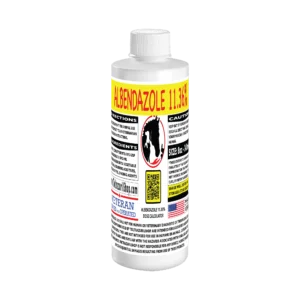-
Animal Products
Albendazole for Sale
$9.95 – $219.95 Select options This product has multiple variants. The options may be chosen on the product pageRated 0 out of 5
Albendazole for Sale
At Albendazole for Sale, we provide a powerful and effective solution for controlling parasitic infections in livestock and pets. Whether you’re a farmer managing a herd or a pet owner caring for your animals, our Albendazole for Sale Liquid Solution is here to help. It’s designed to effectively treat a wide variety of parasites, ensuring the health and well-being of your animals.
Why Choose Albendazole for Sale?
Managing animal health can be challenging, especially when it comes to dealing with parasites. Albendazole for Sale is a trusted product that makes this task easier. Our liquid solution is designed to eliminate a broad range of internal parasites, including roundworms, tapeworms, liver flukes, and lungworms. These parasites can cause serious health issues for your animals, leading to reduced productivity and overall poor health. Albendazole helps prevent these problems, giving your animals the best chance at living a healthy life.
Effective and Fast-Acting
One of the reasons why Albendazole for Sale is so popular is because it works quickly. The liquid formulation is easily absorbed by your animals, providing fast relief from parasitic infections. This rapid action helps to reduce the burden of parasites, allowing your animals to recover quickly and get back to their best selves.
Convenient and Easy to Use
Albendazole for Sale is easy to administer. The liquid form allows you to mix it with your animals’ feed or water, or you can give it directly to them using a syringe. This makes it simple to ensure that your animals receive the right dose every time. Plus, the solution comes in different sizes, so whether you have a few pets or a large farm, you’ll find a packaging option that suits your needs.
Safe for Your Animals
Your animals’ safety is our priority. Albendazole for Sale is known for being safe when used correctly. When you follow the recommended dosing instructions, the product will provide effective results without causing harm to your animals. Always consult with a veterinarian if you’re unsure about dosage or how to use the product for your specific animals.
Suitable for All Types of Animals
Albendazole for Sale can be used for a wide range of animals. Whether you have cattle, horses, sheep, goats, pigs, dogs, cats, or even exotic animals like birds or reptiles, Albendazole is an effective solution. It’s perfect for both small farms and large-scale operations, as well as pet owners who want to keep their animals healthy and parasite-free.
How Does Albendazole Work?
Albendazole works by targeting and eliminating internal parasites that live inside your animals. These parasites can cause various health issues, from poor growth to digestive problems and even death in extreme cases. Albendazole targets these parasites and stops them from multiplying, which helps your animals feel better and stay healthier.
Easy to Administer
One of the greatest benefits of Albendazole for Sale is how easy it is to administer. With the liquid solution, you can either mix it into your animal’s food or water, or give it directly to them using a syringe. This makes it a convenient choice for busy farmers or pet owners, and ensures that your animals are getting the right dose every time.
Product Features and Benefits:
- Broad-Spectrum Parasite Control: Albendazole for Sale helps control a wide variety of parasites, including roundworms, tapeworms, liver flukes, and lungworms.
- Fast-Acting: The liquid formulation is rapidly absorbed, providing quick relief from parasitic infections.
- Convenient and Easy to Use: Mix with food or water, or give directly to animals with a syringe for simple and precise dosing.
- Safe and Effective: When used correctly, Albendazole for Sale is safe and effective for a variety of animals.
- Multiple Size Options: Available in different bottle sizes to fit the needs of both small and large farms or for pet owners with a few animals.
Available Sizes
We understand that every farm or home is different, which is why we offer Albendazole for Sale in multiple sizes to fit your needs:
- 1 oz Bottle: Ideal for small animals or single treatments.
- 4 oz Bottle: Convenient for smaller herds or occasional use.
- 8 oz Bottle: Great for medium-sized herds or more frequent treatments.
- 32 oz Bottle: Perfect for larger herds or moderate operations.
- 1/2 Gallon (64 oz) Jug: Best for high-demand use in livestock care.
- 1 Gallon (128 oz) Jug: Ideal for large-scale operations or frequent use.
Safe Use and Dosage
To ensure the best results and safety for your animals, always follow the recommended dosing instructions. The dosage will depend on the species, weight, and severity of the infection. Albendazole for Sale is typically dosed at 7.5 mg/kg for most livestock species. If you’re unsure about the right dosage for your animals, it’s always a good idea to consult with a veterinarian.
Order Albendazole for Sale Today!
Keeping your animals healthy and free from parasites has never been easier. Albendazole for Sale is your go-to solution for effective and safe parasite control. Whether you’re managing livestock or caring for your pets, this trusted product will help you ensure that your animals stay healthy, productive, and happy.
Don’t wait – order your Albendazole for Sale today and give your animals the care they deserve!
